by Naomi L. | November 29, 2017 | Blog, Creative Writing |
It’s the end of November, with only one more day left in NaNoWriMo! If you’ve finished your 50,000-word novel (or definitely will tomorrow), congratulations! There’s no better feeling than accomplishing such a huge goal!
As the month winds down, you’re probably wondering what comes next. What do you do after winning NaNoWriMo? There’s still a ways to go to get your book out there, so to help you find your footing, I’ll break it down into five simple steps. For your reference, here’s a brief post-NaNoWriMo guide to help you get from messy manuscript to published novel! Good luck!
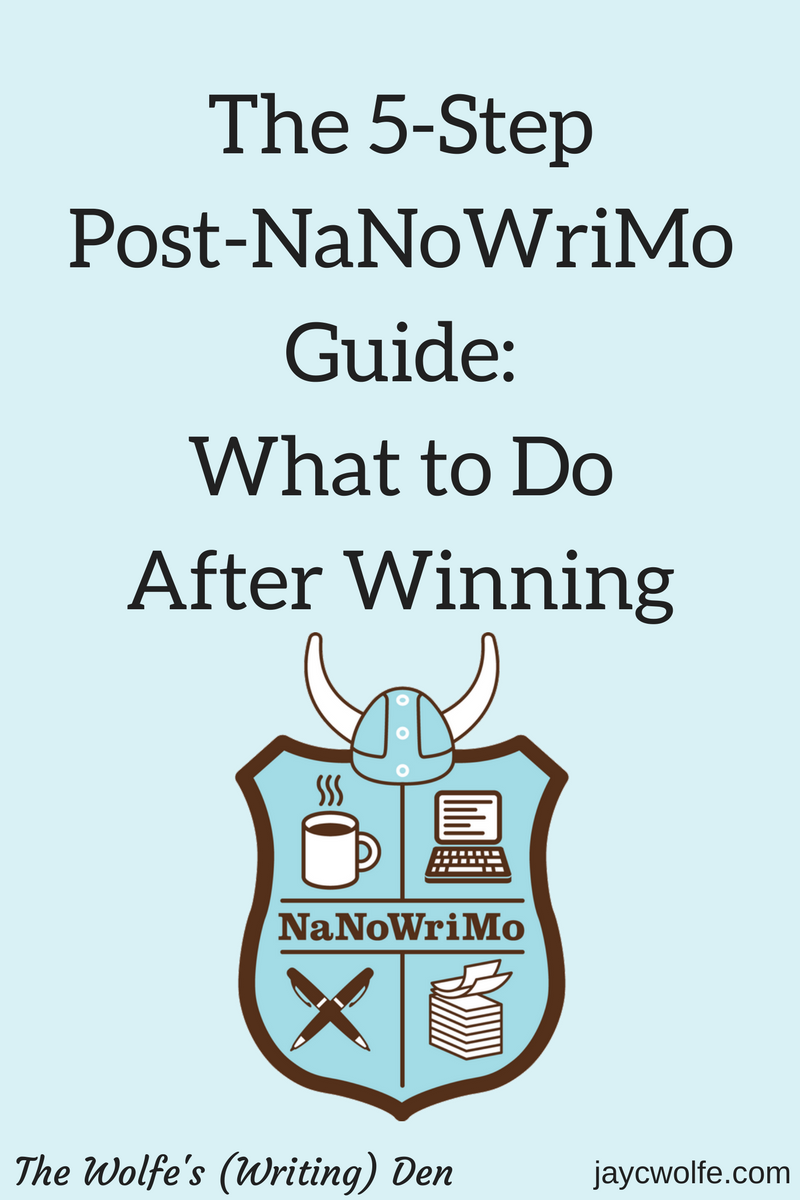
Step 1: Celebrate!
Hey, you just wrote 50,000+ words in a month! That’s nothing to sneeze at! Your novel’s journey is far from over, of course, but you don’t need to worry about publishing or marketing just yet. For now, take a bow and congratulate yourself on achieving something incredible! Go you!

Step 2: Take a break from your manuscript
After 30 days of writing nonstop, you’re probably sick of looking at your manuscript. The good news is that you don’t have to for a while! The writing part is done; now’s the time to let the first draft sit and breathe.
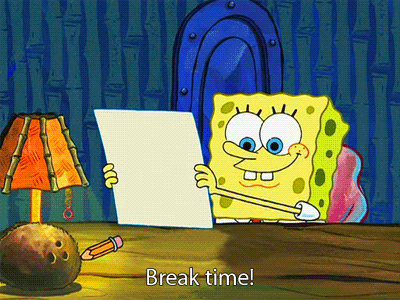
How long exactly varies from writer to writer. Two weeks to a month should be enough, but feel free to take a little more time if you need it (so long as you remember to come back to it). Go back to writing your other stories or just relax with your family over the holiday season. When the time is right to return to your manuscript, you’ll know it.
Step 3: Edit with care
November was the time to rush through your first draft just to get it done. Next comes the editing, which shouldn’t be nearly as rushed.
Once you’ve let your manuscript sit for a while, take it back up for a few thorough rounds of revisions. You don’t have to do it at sloth speed, of course, but don’t feel like you have to pants it like you did in the first round. Polish your work as much as you can until there’s nothing left you can do, then prepare to send it to a professional editor (overlapping with Step 5). Repeat this step every time you get it back until your novel is ready for publication!
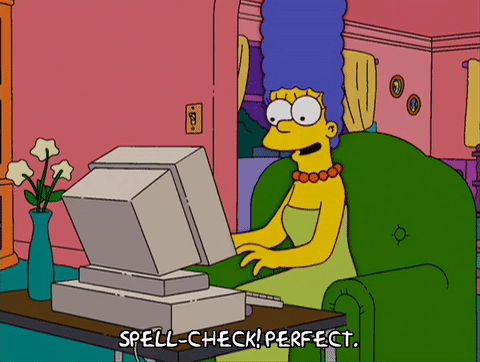
Important: Do not skip this step! However proud of it you may (and should) be, your manuscript is not ready to be self-published or submitted to a publisher at the end of November! You must edit it yourself and send it to an editor at least once before declaring your novel complete!
Step 4: Regain your confidence and keep going
The editing phase is the part where many aspiring novelists lose a large chunk of their self-confidence. Whereas writing encourages you to keep moving forward without looking back, editing forces you to confront all the mistakes you made in the first draft. Prepare yourself; it can be a real slap in the face!
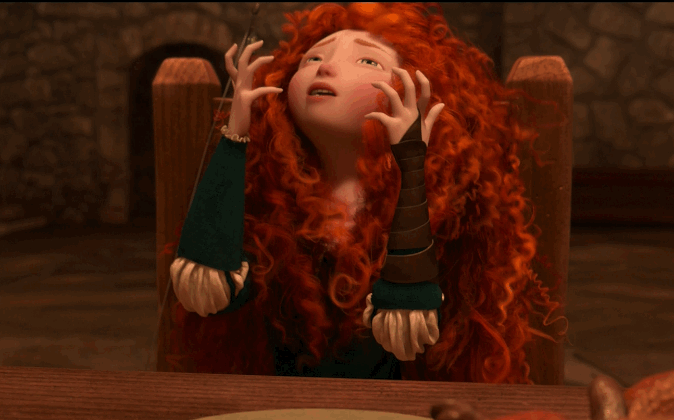
Trying to sort out everything from your plot holes and inconsistencies to your run-on sentences and misplaced commas can take a huge toll on your morale, which is why it’s important to step back and take a deep breath. Remember why you wrote this story in the first place. Know that the fear and self-doubt you feel is normal, but you can conquer it. You’ve already come this far, so buckle down and keep going until your final draft is done!
Step 5: Prepare your novel for publication!
Ok, this part actually constitutes a series of steps, but I’ll simplify it here so as not to overwhelm you. Once you’ve done as much as you can yourself, it’s time to reach out to others for help. It may sound scary, especially if you’re an introvert, but there’s no way around it. You can’t make it to the finish line alone!
Get feedback on your early drafts from beta readers: family, friends, and/or online critique groups. Hire an editor to help you polish your manuscript to a readable form (again, this part overlaps with Step 3). Reach out to book agents and publishers (if you’re going the traditional route), or find book formatters, cover designers, and book marketing outlets (if you’re self-publishing).
I know it all seems overwhelming right now, but you can do this! The key is to take it one step at a time. Keep working toward your dream and you’ll be a published author before you know it!
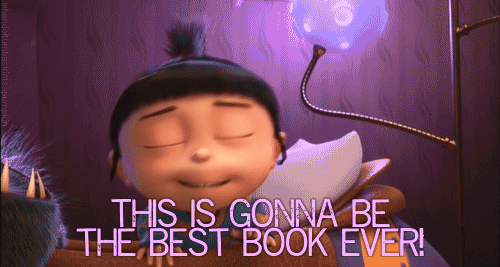
Did you win this year’s NaNoWriMo? Still working on your first draft, or are you ready to start preparing your novel for publication?
Image courtesy of National Novel Writing Month
by Naomi L. | November 22, 2017 | Blog, Creative Writing |
Search for tips on how to be a better writer and you’ll find this piece of advice anywhere: read. It’s no secret that reading is good for you, but no one benefits more from reading books than people who want to write their own. Reading can teach you a lot about the craft of writing, so if you really want to improve your skills, start by expanding your library. Books are among your greatest tools for writing success!
So to elaborate on the second point of my list of good writing habits, here are five ways that reading makes you a better writer. Enjoy, and best of luck in your writing career!
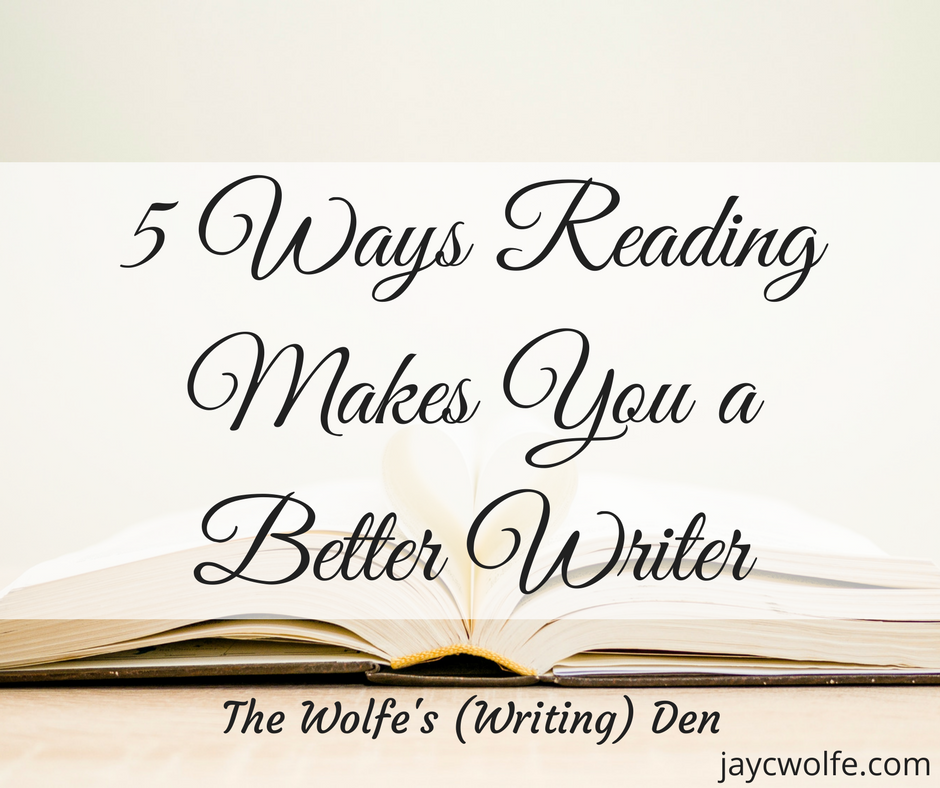
1) Reading teaches you the basics of story structure.
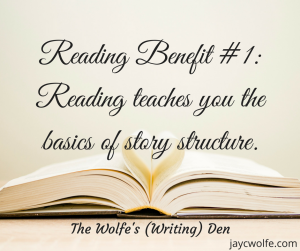 Let’s start with the obvious, shall we? If you want to learn how to write a story, the best way to start is by reading one. It’s as simple as that—so simple, in fact, that we already learned this lesson as children!
Let’s start with the obvious, shall we? If you want to learn how to write a story, the best way to start is by reading one. It’s as simple as that—so simple, in fact, that we already learned this lesson as children!
Think about the last time you read a fairy tale or watched a Disney movie. Notice that these stories always have a very basic plot structure: Hero enters, Villain causes Conflict, Hero fights Villain, Hero defeats Villain, everyone lives Happily Ever After. Doesn’t get any simpler than that, does it?
Dramatic structure refers to these steps as exposition, rising action, climax, falling action, and resolution. Of course, not all stories will follow exactly the same outline—you don’t always need a villain to create conflict, for example—but regardless of content, they will invariably have structure. Reading many books in various genres will reveal what all stories have in common, and that’s the first step toward becoming a master of fiction!
2) You learn what works in a story (and what doesn’t).
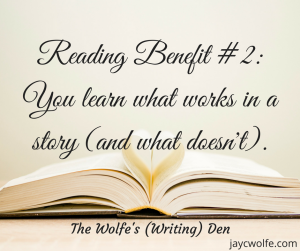 After learning the basics of story structure, the next step is to learn how to write a good story. This is easier said than done, which is why it’s important to read as many good books as possible. Only by understanding what works in other writers’ stories can you figure out how to improve yours.
After learning the basics of story structure, the next step is to learn how to write a good story. This is easier said than done, which is why it’s important to read as many good books as possible. Only by understanding what works in other writers’ stories can you figure out how to improve yours.
Now I know what you’re thinking: If art is subjective and everyone has different tastes, how can you know which books are “good”? The only way to be sure is by reading as many as you can and deciding for yourself what makes a story worth reading. An excellent piece of advice for beginning writers is to start by writing what you like, and you can’t know what you like unless you read!
Of course, bad books can be just as eye-opening as good ones. Who among us hasn’t tried to slog their way through a terribly written novel with flat characters and boring plot points? I know it sounds like torture, but the good news is that reading a bad book isn’t a complete waste of time: by recognizing the flaws that turn you off to someone else’s story, you’ll know what to avoid in yours. In short: Be the next J.K. Rowling, not the next Stephenie Meyer!
3) You get a better sense of how to write in your genre.
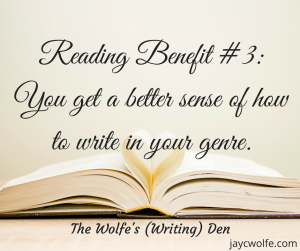 While reading is good in general, reading certain types of stories can be especially beneficial for writers. Every genre has its distinct traits, so reading in your genre of choice can teach you specific writing techniques that you couldn’t pick up from other books.
While reading is good in general, reading certain types of stories can be especially beneficial for writers. Every genre has its distinct traits, so reading in your genre of choice can teach you specific writing techniques that you couldn’t pick up from other books.
If you want to write fantasy, read series like Harry Potter or The Lord of the Rings to learn how to incorporate magic into your world in a logical and believable way. If you choose dystopian fiction, books like 1984, The Handmaid’s Tale, or The Hunger Games will help you understand how to write a future society based on a single drastically different detail. Read Stephen King‘s stories to learn how to write thrilling suspense and horror, or read Jane Austen for a sense of how to write good romantic and historical fiction.
Whatever genre you choose to write in, read those types of books until you feel confident you can write a good story that fits the style… and then keep on reading! So long as you continue indulging in books, you’ll find that you’ll never stop learning for the rest of your writing career. Your stories can only keep getting better!
4) Books expand your imagination.
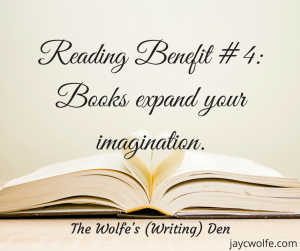 When I started reading as a little kid, it opened my entire world to hundreds of new possibilities. My love of books inspired me to start writing when I was nine years old, and I’ve never looked back. I couldn’t tell you how many of my favorite story ideas have come from reading; to this day, no matter what kind of stories I write, I can always find some ideas from books I love and influence from my favorite authors in them!
When I started reading as a little kid, it opened my entire world to hundreds of new possibilities. My love of books inspired me to start writing when I was nine years old, and I’ve never looked back. I couldn’t tell you how many of my favorite story ideas have come from reading; to this day, no matter what kind of stories I write, I can always find some ideas from books I love and influence from my favorite authors in them!
Reading books is a great way to battle writer’s block because books are a rich source of ideas. You don’t have to outright copy other writers’ ideas, of course—in fact, you shouldn’t—but emulating the concepts and styles of writers you admire will help you develop more original ideas of your own in the long run.
So whenever you’re starved for ideas, pick up a novel and see what jumps off the page. You’d be surprised how many creative new ideas are hiding in plain sight on your shelf!
5) Reading replenishes your writing energy.
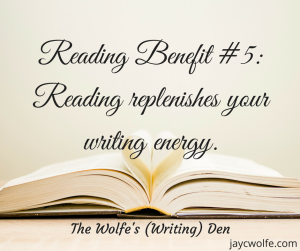 Despite all the previous points on this list, you don’t really need any other reason to read than the fact that it’s fun! Let’s face it, we all need regular breaks from our work, even when that work is our life’s passion (like writing). If you’re just not feeling the words flow, there’s no shame in stepping away from your story for a while to read someone else’s!
Despite all the previous points on this list, you don’t really need any other reason to read than the fact that it’s fun! Let’s face it, we all need regular breaks from our work, even when that work is our life’s passion (like writing). If you’re just not feeling the words flow, there’s no shame in stepping away from your story for a while to read someone else’s!
Reading has been proven to relieve stress and reduce anxiety, which is extra helpful for writers. What writer hasn’t felt stressed after hours of struggling with creative blocks or self-doubt, right? (I know I have.) Even if you are feeling relaxed and productive, fiction is a great escape from mundane routine. We’ve all had to recharge after long stretches of writing, and if you’re going to pause anyway, why not use that time to indulge in a hobby that will help you get better at it?
So the next time you feel drained of the energy to write, try picking up a book. You may find it’s just the thing you need to get you back on your writing streak!
What are your thoughts on these benefits of reading? How has reading made you a better writer?
Photo by Michał Grosicki on Unsplash
by Naomi L. | November 15, 2017 | Blog, Creative Writing, Featured |
In many ways, fiction writing is a profession without routine. One day you’re outlining your plot and character descriptions, another you’re writing or editing scenes, still another you’re preparing your novel for publication and marketing. It’s a great career path for artists who like to be surprised by their work every day! But there is one thing that separates the truly productive writers from the dreamers and wannabes, and that’s developing good writing habits. If you really want to be a professional writer, you must build these habits; they’re the best way to keep you writing your whole life!
So for those of you who are serious about being productive writers, here are five good writing habits you should start developing today. Enjoy, and best of luck in your writing career!
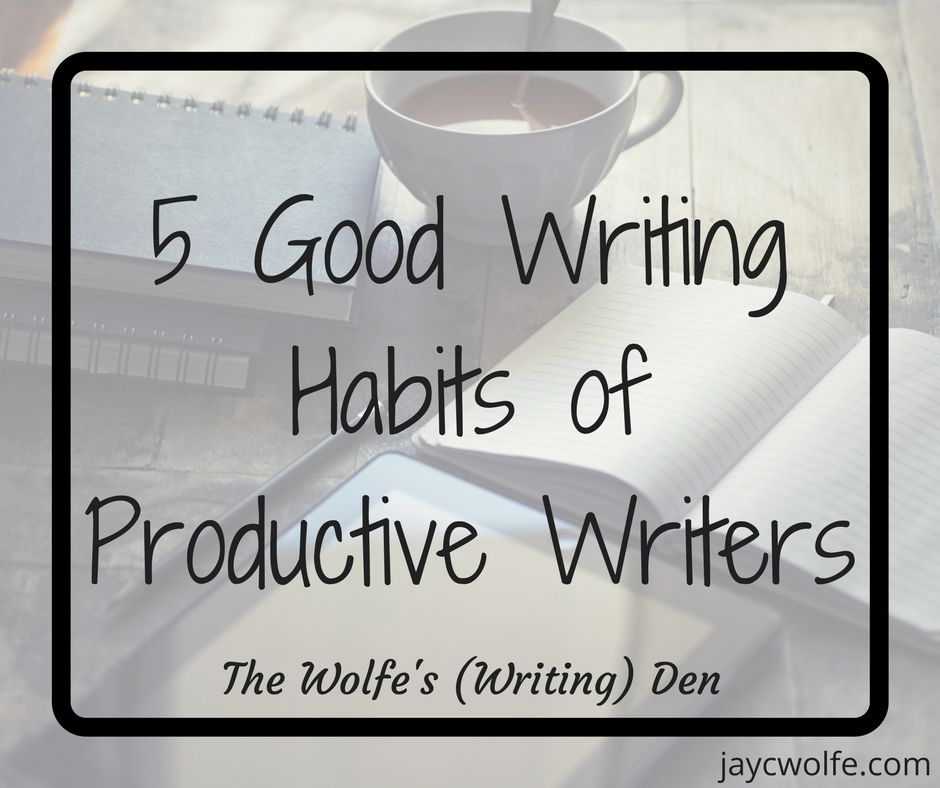
Good Writing Habit #1: Write every single day.
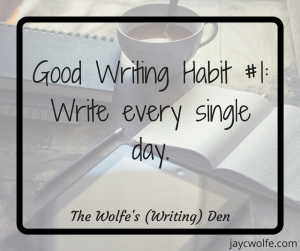 If you truly want to be a writer, you must write; otherwise you’re just a dreamer with an idea. But it’s not enough to write every once in a while; then you’re just a dreamer who sometimes writes their ideas down. If you’re serious about dedicating your life to writing, you must make writing your life. Not tomorrow, not in a week or a month or a year, today. Make every today a writing day. If that sounds harsh and repetitive, get ready because you’ll hear this advice everywhere until it sinks in: if you want to be a writer, you must write every single day.
If you truly want to be a writer, you must write; otherwise you’re just a dreamer with an idea. But it’s not enough to write every once in a while; then you’re just a dreamer who sometimes writes their ideas down. If you’re serious about dedicating your life to writing, you must make writing your life. Not tomorrow, not in a week or a month or a year, today. Make every today a writing day. If that sounds harsh and repetitive, get ready because you’ll hear this advice everywhere until it sinks in: if you want to be a writer, you must write every single day.
Of course, writing every day won’t always be easy (that’s what Habits 4 and 5 are for), but even the smallest steps of progress are better than not getting anything done at all. If you really have trouble writing when you should, try setting a writing schedule or some simple tasks to ensure you stay productive. Write down new ideas, outline your novel, work on a short story or a new scene of your book. Whatever you do, make sure you log some writing time every day until it becomes a habit. Hard as it may seem at first, you’ll soon find that it feels wrong not to write every day. Your future novelist self will thank you!
Good Writing Habit #2: Read as often as possible.
If you don’t have time to read, you don’t have the time (or the tools) to write. Simple as that. – Stephen King, On Writing
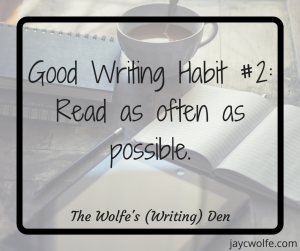 This may sound like a given, but you’d be amazed how many aspiring writers “don’t have time to read.” A thorough search through guest posts on writing blogs will reveal that virtually every editor, at one time or another, has rolled their eyes at a wannabe novelist who didn’t have a good answer to the question, “So what are you reading?” If you never want to be caught off guard by this question, always make time to read!
This may sound like a given, but you’d be amazed how many aspiring writers “don’t have time to read.” A thorough search through guest posts on writing blogs will reveal that virtually every editor, at one time or another, has rolled their eyes at a wannabe novelist who didn’t have a good answer to the question, “So what are you reading?” If you never want to be caught off guard by this question, always make time to read!
The point of reading often is to get a better feel for the craft of writing. The more books you read, the more you’ll understand what makes a good story (or a bad one). Not sure where to start? Try picking up a few popular novels in your favorite genre; these will teach you what goes into writing that type of story, or at least give you an idea if it’s the right genre for you. Don’t have a favorite? Try some popular books in a variety of genres until you find one you love! As long as you keep reading, you’ll have the tools and inspiration you need to write!
Good Writing Habit #3: Write now, edit later.
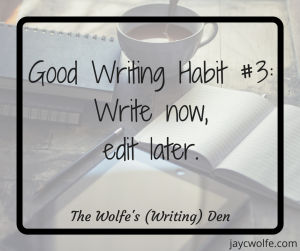 One of the most common mistakes that beginning writers make is to edit while writing. It’s a tough habit to break! I know this because I still do it myself, despite knowing better. Sometimes I’ll even go as far as to not continue a sentence until I’m sure I can get exactly the right wording onto the page the first time. But as I’ve found time and again, that’s not how writing works.
One of the most common mistakes that beginning writers make is to edit while writing. It’s a tough habit to break! I know this because I still do it myself, despite knowing better. Sometimes I’ll even go as far as to not continue a sentence until I’m sure I can get exactly the right wording onto the page the first time. But as I’ve found time and again, that’s not how writing works.
First drafts will always be messy. There’s no way around that. A story is never going to be perfect right out of the gate, and that’s okay. The point of a first draft is just to get the idea out of your head; perfecting it comes later, during the editing phase. The sooner you accept this, the more productive you’ll become in your writing. So don’t worry about getting it right the first time; just keep writing and don’t look back until your first draft is done. Always remember: Done is better than perfect!
Good Writing Habit #4: Set a daily writing goal (and stick to it).
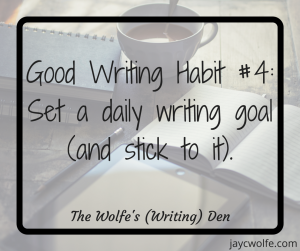 As a writer, there will be days when you simply can’t muster up the energy or motivation to write. That’s where daily writing goals come in. When you know you should write but can’t be sure how much will count as “productive”, it helps to set a daily word count goal. That way, you can write a “bare minimum” on those low-energy days and still feel like you made progress!
As a writer, there will be days when you simply can’t muster up the energy or motivation to write. That’s where daily writing goals come in. When you know you should write but can’t be sure how much will count as “productive”, it helps to set a daily word count goal. That way, you can write a “bare minimum” on those low-energy days and still feel like you made progress!
Stephen King recommends starting at 1000 words a day, but it’s up to you to figure out what goal works best for you. If you’re way too busy to hit 1000 every day, feel free to lower the bar to a more achievable goal. Got plenty of free time on your hands? Push yourself to write 1500 or 2000 words a day! Not one for word counts? Set a daily goal instead to finish a chapter or edit one more scene. The key is to find the sweet spot of a goal low enough for you to reach every day but still high enough to bring you substantially closer to a finished work of art. Whatever goal you choose, always stay productive!
Good Writing Habit #5: Protect your writing time and space.
Be ruthless about protecting writing days, i.e., do not cave in to endless requests to have “essential” and “long overdue” meetings on those days. – J.K. Rowling
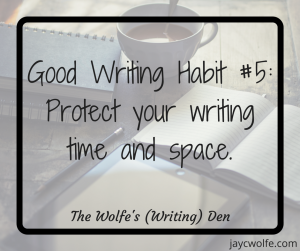 Writing is one of the loneliest professions in the world, but most writers like it that way. The problem is when we don’t have enough time or space to dedicate to our work. That’s why I can’t stress enough the importance of having a designated writing area and schedule. It’s just as important as setting a daily goal; you can’t hope to consistently meet your quota unless you can always get into the right mindset, and one of the best ways to do this is by retreating into a corner where your imagination can flow freely without distractions. If you build the habit of visiting this space at the same time every day, writing will become a lot easier in the long run!
Writing is one of the loneliest professions in the world, but most writers like it that way. The problem is when we don’t have enough time or space to dedicate to our work. That’s why I can’t stress enough the importance of having a designated writing area and schedule. It’s just as important as setting a daily goal; you can’t hope to consistently meet your quota unless you can always get into the right mindset, and one of the best ways to do this is by retreating into a corner where your imagination can flow freely without distractions. If you build the habit of visiting this space at the same time every day, writing will become a lot easier in the long run!
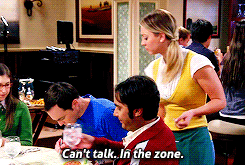 After setting your writing time and space, the next step is to guard them from the rest of your world. Writing time is sacred, and therefore should be treated as such. Close the door and work for at least an hour on a computer with no Internet connection, or for real distraction-free writing, try writing longhand on paper first and editing later as you transcribe your work to a computer. Also make sure to tell your loved ones not to disturb you during your writing time. My boyfriend understands this better than anyone I know: I love him to pieces, but he knows I’ll get crabby if he so much as tries to hug me while I’m “in the zone.” Such is the reality of a writer! Protect your writing time and space and the rest of your world will be better for it!
After setting your writing time and space, the next step is to guard them from the rest of your world. Writing time is sacred, and therefore should be treated as such. Close the door and work for at least an hour on a computer with no Internet connection, or for real distraction-free writing, try writing longhand on paper first and editing later as you transcribe your work to a computer. Also make sure to tell your loved ones not to disturb you during your writing time. My boyfriend understands this better than anyone I know: I love him to pieces, but he knows I’ll get crabby if he so much as tries to hug me while I’m “in the zone.” Such is the reality of a writer! Protect your writing time and space and the rest of your world will be better for it!
Do you practice these good writing habits? What other habits would you add to this list?
by Naomi L. | November 8, 2017 | Blog, Creative Writing |
So you’ve made it through the first week of NaNoWriMo! How’s that novel coming along? Whether you’re a veteran or this is your first NaNoWriMo ever, chances are you’re already starting to feel a little doubt creeping in. Maybe you’ve fallen behind on your goal, or maybe you’re beginning to feel the burnout from all that writing. But the moment your energy falters is when you expose yourself to the poisonous idea that maybe you’re not a real writer after all. Don’t give in to that thought!
So to keep you motivated through at least the next week of NaNoWriMo, here are ten signs that you are a real writer. Remind yourself of some (or all) of these truths every day and know that you can do this! Good luck!
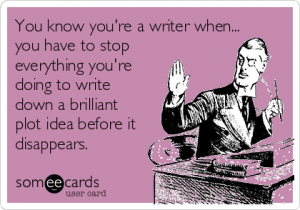 1) Telling stories is one of your best and favorite skills. – Nothing says “I’m a writer” like the gift of telling stories. If your friends and family often read your work and ask you to tell them a tale every time you hang out, you know you’re on the right track!
1) Telling stories is one of your best and favorite skills. – Nothing says “I’m a writer” like the gift of telling stories. If your friends and family often read your work and ask you to tell them a tale every time you hang out, you know you’re on the right track!
2) You’d rather spend time in your fictional worlds than your real one. – Where would you rather celebrate the holidays: the office Christmas party or the Yule Ball at Hogwarts? That’s what I thought.
3) The conversations you have with the voices in your head are way more interesting than the ones you have with real people. – Who wants to waste time on small talk when you could be discussing dragons or planning how to stop that alien invasion? The characters in your head will always have something more interesting to contribute to the conversation!
4) You carry a notebook with you everywhere you go. – Inspiration strikes when you least expect it. You gotta be ready to capture those ideas when they come to you!
5) You can find the tiniest flaws in your favorite novels. – Thinking like a writer means reading like a writer. Because you understand the craft, you can read any book and spot the smallest errors from continuity to misused words that most readers can’t. It’s kind of like having a superpower, isn’t it?
6) You never stop brainstorming story ideas. Ever. – You could be in the middle of an important business meeting, out to lunch with friends, or spending the holiday with family, but your creative mind will never shut off completely. Story ideas are everywhere! How could you possibly stop thinking about them?
7) You’re pretty sure your blood is 90% coffee. – How else are you supposed to power through those late-night writing sessions?
8) You’re a master of procrastination. – Sure, everyone procrastinates, but nobody can perfect the art quite like writers can. Writing is hard, ok? Sometimes we need a break to read or snack or play video games. Just five more minutes, I swear!
9) But once you get into that writing groove, you couldn’t stop if a meteor hit you! – Writing time is sacred. You know you’re a writer when even your family and/or significant other know not to disturb you when you’re in the zone. Bonus points if it’s because they know they’ll be punished if they do!
10) Writing is your life! – You love to write! You’ve already committed to writing a novel, haven’t you? What other proof do you need that you’re a real writer?
Have you ever doubted yourself or your writing skills? How do you handle those slips in self-confidence?
by Naomi L. | November 1, 2017 | Blog, Creative Writing |
Welcome to November, otherwise known to writers as National Novel Writing Month! It’s time once again to shift your writing into high gear by writing a 50,000-word novel in 30 days! Of course, it’s not so easy to take on this challenge without a fair amount of motivation to get you going, and one of my favorite sources of writing inspiration is collections of quotes by well-established writers. Over the past two years, I’ve started November by sharing NaNoWriMo motivation in the form of ten writing quotes from famous authors. Now let’s dive into another set of quotes for inspiration!
So to get you motivated for NaNoWriMo 2017, here are another ten inspirational quotes about writing from famous storytellers. Enjoy, and good luck in this year’s NaNoWriMo!

1) If you want to be a writer, you must do two things above all others: read a lot and write a lot. – Stephen King
2) Stories may well be lies, but they are good lies that say true things, and which can sometimes pay the rent. – Neil Gaiman
3) After nourishment, shelter and companionship, stories are the thing we need most in the world. – Philip Pullman
4) All you have to do is write one true sentence. Write the truest sentence that you know. – Ernest Hemingway
5) A word after a word after a word is power. – Margaret Atwood
6) There is something delicious about writing the first words of a story. You never quite know where they’ll take you. – Beatrix Potter
7) A writer is someone for whom writing is more difficult than it is for other people. ― Thomas Mann, Essays of Three Decades
8) I write to give myself strength. I write to be the characters that I am not. I write to explore all the things I’m afraid of. – Joss Whedon
9) You can make anything by writing. – C.S. Lewis
10) Write the kind of story you would like to read. People will give you all sorts of advice about writing, but if you are not writing something you like, no one else will like it either. – Meg Cabot
What are your thoughts on these writing quotes? Any others you’d add to the list for NaNoWriMo?
by Naomi L. | October 25, 2017 | Blog, Creative Writing |
With Halloween just around the corner, it’s a great time to binge watch scary movies and practice writing horror stories. And the scariest part of a horror story—as well as one of the scariest parts of most stories in general—is usually the antagonist, the villain who embodies the evil of the plot and serves as the main barrier between the hero and victory.
But antagonists can also be the most challenging characters to write. Not only do you need to make them just as interesting as your protagonists in order to carry the story, but you often have to do it in fewer words, as villains usually get less focus and have limited room for character development. Not every writer can pull this off well, but fortunately, there are a few writing tips you can use to turn your villains from flat and boring to fascinating and terrifying.
So in the spirit of Halloween and scary characters, here are three writing tips to help you create villains who are just as interesting as your heroes. Enjoy!
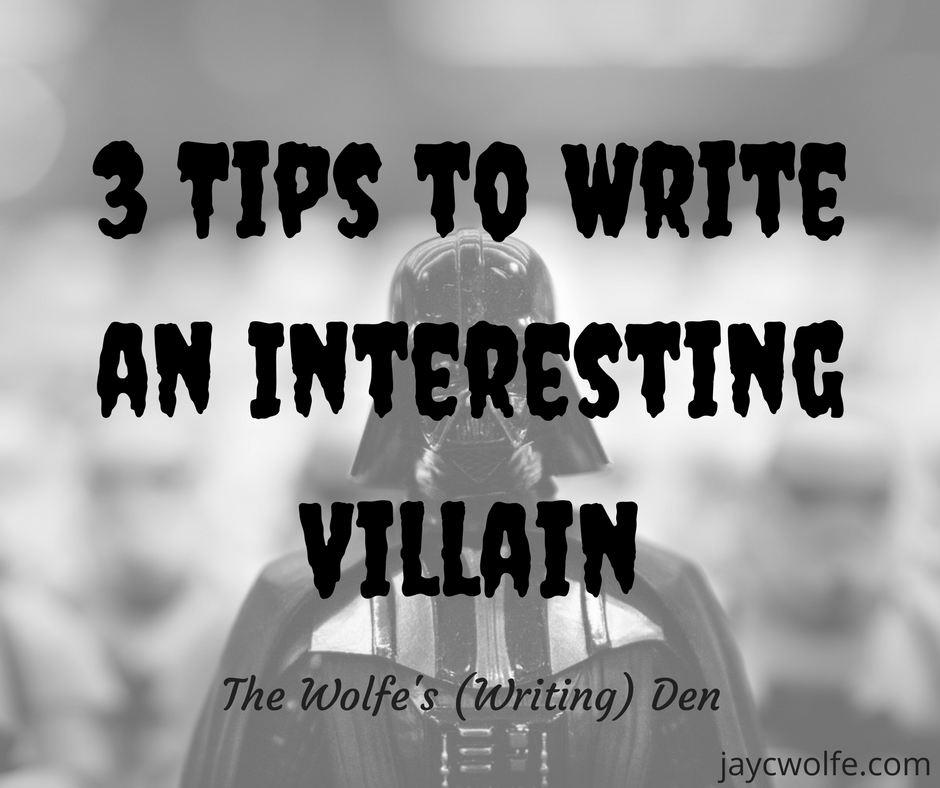
1) Villains should be just as three-dimensional as their heroic counterparts.
I’m bad, and that’s good. I will never be good and that’s not bad. There’s no one I’d rather be than me. – Bad-Anon closing affirmation, Wreck-It Ralph (2012)
Have you ever read a book or watched a movie that starred a kickass hero, but for some reason they never seemed to reach the peak of their awesomeness? Chances are what could have been a great story arc fell flat because of a terribly written villain.
We know that part of telling a good story is creating good characters, but many writers tend to focus all that character-building attention on their protagonists and not enough on their antagonists. (Don’t feel bad if you can relate; I’ve definitely been guilty of this myself.) I’m sure at some point, we’ve all fallen into the trap of making an antagonist “just a bad guy”, but it’s important to remember that villains are people too—well, in the broader sense of “sentient beings”—and much like real people, all characters should be three-dimensional. No exceptions.
Personally, I hate it when a villain has literally zero depth. It may seem like a good idea on the surface to make a bad guy as bad as possible, but no one is purely evil for the sake of being evil, any more than a hero is good just because the story calls for it. If we take exceptional care to give our protagonists clear dreams, goals, strengths, and weaknesses, we should do the same for our antagonists. A hero is only as good as their villain, right?
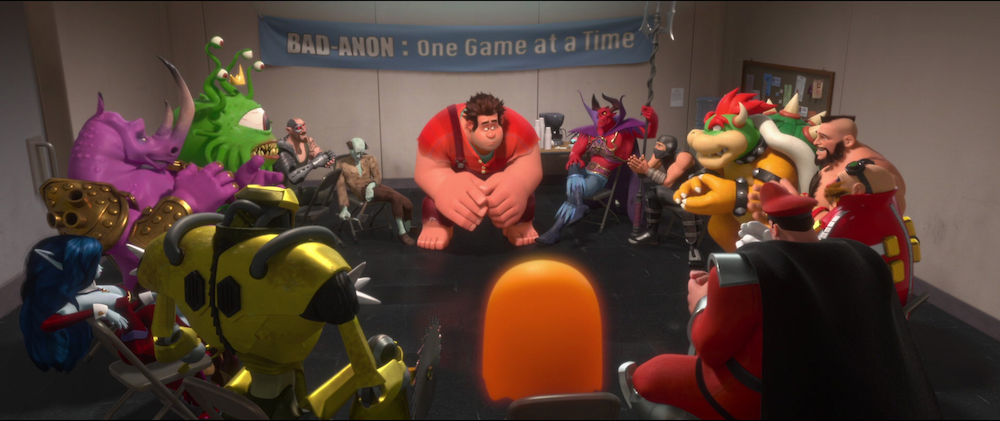
The Bad-Anon support group for video game villains (Wreck-It Ralph, 2012)
One of my favorite modern examples of how much depth a villain can have is the 2012 Disney movie Wreck-It Ralph. Given how everyone treats him like a monster and almost no one respects him, Ralph is a good example of a character who was forced into the role of a villain despite not actually deserving it. Of course, after leaving his game and setting out on his own adventure, he does prove to everyone that he’s much more than a “bad guy” in the end. While the movie isn’t about a “villain” per se, Wreck-It Ralph does teach two important lessons about antagonists:
- Villains and conflict are indispensable to storytelling (and therefore must be respected) – Fix-It Felix Jr. is no longer playable without “the bad guy who wrecks the building”
- No one is the villain of their own story – despite being the bad guy of Fix-It Felix Jr., Ralph is clearly the hero of his own adventure
 In contrast, my least favorite antagonists are usually the ones whose only defining characteristic is “being evil”. You know who I’m talking about: those one-dimensional a-holes with zero redeeming qualities who can make you fume or gag every time they appear on page or screen, like:
In contrast, my least favorite antagonists are usually the ones whose only defining characteristic is “being evil”. You know who I’m talking about: those one-dimensional a-holes with zero redeeming qualities who can make you fume or gag every time they appear on page or screen, like:
It’s one thing to give your character less-than-noble motives; it’s another to go out of your way to make the audience hate them. But then again, even “pure evil” can be interesting when written well (case in point: the villains listed above are all bad people, but not necessarily bad characters). It all comes down to a delicate balance between characterization and storytelling.
So when writing your antagonist, always make sure you give them as much background and attention to detail as you give your heroes. Remember that a good villain has depth and personality, not just “evil plans”. Bonus points if you can make your audience sympathize with the bad guy. After all, hero or villain, we’re all still people. Which brings me to the next point…
2) Nobody starts out as a bad guy, not even villains.
You either die a hero, or you live long enough to see yourself become the villain. – Harvey Dent/Two-Face, The Dark Knight (2008)
Although it’s easy to think of the world in terms of good and evil, the fact is that all people start out as blank slates. Every individual has a story to tell, a history behind the person they become. It’s the circumstances of one’s story—and the choices they make in response to those circumstances—that determine if they become a hero or a villain (or neither). In a nutshell, bad guys aren’t born, but made.

Maleficent crashes Princess Aurora’s christening (Maleficent, 2014)
A well-known modern example of the making of a villain is Disney’s 2014 Sleeping Beauty retelling, Maleficent. While the 1959 animated movie portrayed this character as little more than a vindictive witch (who seriously could not let go of a grudge), this version of the story digs a little deeper into how the fairy Maleficent became malicious enough to curse an innocent child. Between the beginning of the film and Aurora’s christening, we learn that Maleficent started out kind and idealistic, but her relationship with Stefan turned her bitter and vindictive against humankind. Say what you will about the film’s execution, but at least it establishes a clear backstory and motive for a character who would otherwise be just another run-of-the-mill fairytale villain.
If you feel your antagonist is missing clear motivation for their actions, try giving them a backstory that explains how they became evil. You don’t have to expose their entire life story to the audience, but at least convince us of their reasons for opposing the heroes. Show us what broke them so badly that it turned them to the dark side. Remember, the only people who start out as bad guys are cartoon villains; everyone else has a story.
3) An interesting villain is just as strong, smart, and capable as the hero (if not more).
A census taker once tried to test me. I ate his liver with some fava beans and a nice Chianti. – Hannibal Lecter, The Silence of the Lambs (1991)
Take a second to think about your favorite villains in any books, movies, or TV shows. What do they all have in common (aside from the fact that they’re doing bad things to good people)? Why do you find them so fascinating? Because they’re good at what they do!
The most interesting and popular villains are usually those who challenge the heroes, and it’s obviously not by being total pushovers. Darth Vader mercilessly kills any subordinate who disappoints him and pushes Luke Skywalker to his limit in their first lightsaber duel. Before his downfall, Voldemort was so terrifying that witches and wizards everywhere were afraid to say his name. A large part of what makes Hannibal Lecter so fascinating and frightening is how mysterious and complex he is. Basically, if an antagonist can draw your full attention and steal every scene they’re in, you know they can give the heroes a run for their money!

The Joker being interrogated by Batman (The Dark Knight, 2008)
One of the most popular examples of a brilliant and highly capable villain is the Joker from The Dark Knight. Aside from his unpredictability, a major reason the Joker is so interesting is that he’s one of the few villains who actually challenges Batman. Like the embodiment of chaos itself, he keeps the hero and the entire police force of Gotham guessing and thwarts them so many times that we as the audience can’t help but wonder what he’s going to do next at every turn. Now that’s a well-written villain!
So keep in mind, if you find your heroes aren’t reaching their full potential, the problem might be with your villains. Superpowers and high intelligence aren’t enough to make a great hero; you have to give them someone or something to use those abilities against. Make your antagonists just as strong and smart as the protagonists, then have them push each other to their limits. Only by overcoming a nearly insurmountable obstacle will your hero’s story arc be as satisfying and captivating as it deserves. In more ways than one, an antagonist can make or break your story!
Do you struggle with writing antagonists? What are your thoughts on these tips for writing an interesting villain? What other tips would you add to this list?








 Let’s start with the obvious, shall we? If you want to learn how to write a story, the best way to start is by reading one. It’s as simple as that—so simple, in fact, that we already learned this lesson as children!
Let’s start with the obvious, shall we? If you want to learn how to write a story, the best way to start is by reading one. It’s as simple as that—so simple, in fact, that we already learned this lesson as children! After learning the basics of story structure, the next step is to learn how to write a good story. This is easier said than done, which is why it’s important to read as many good books as possible. Only by understanding what works in other writers’ stories can you figure out how to improve yours.
After learning the basics of story structure, the next step is to learn how to write a good story. This is easier said than done, which is why it’s important to read as many good books as possible. Only by understanding what works in other writers’ stories can you figure out how to improve yours. While reading is good in general, reading certain types of stories can be especially beneficial for writers. Every genre has its distinct traits, so reading in your genre of choice can teach you specific writing techniques that you couldn’t pick up from other books.
While reading is good in general, reading certain types of stories can be especially beneficial for writers. Every genre has its distinct traits, so reading in your genre of choice can teach you specific writing techniques that you couldn’t pick up from other books. When I started reading as a little kid, it opened my entire world to hundreds of new possibilities. My love of books inspired me to start writing when I was nine years old, and I’ve never looked back. I couldn’t tell you how many of my favorite story ideas have come from reading; to this day, no matter what kind of stories I write, I can always find some ideas from books I love and influence from my favorite authors in them!
When I started reading as a little kid, it opened my entire world to hundreds of new possibilities. My love of books inspired me to start writing when I was nine years old, and I’ve never looked back. I couldn’t tell you how many of my favorite story ideas have come from reading; to this day, no matter what kind of stories I write, I can always find some ideas from books I love and influence from my favorite authors in them! Despite all the previous points on this list, you don’t really need any other reason to read than the fact that it’s fun! Let’s face it, we all need regular breaks from our work, even when that work is our life’s passion (like writing). If you’re just not feeling the words flow, there’s no shame in stepping away from your story for a while to read someone else’s!
Despite all the previous points on this list, you don’t really need any other reason to read than the fact that it’s fun! Let’s face it, we all need regular breaks from our work, even when that work is our life’s passion (like writing). If you’re just not feeling the words flow, there’s no shame in stepping away from your story for a while to read someone else’s!
 If you truly want to be a writer, you must write; otherwise you’re just a dreamer with an idea. But it’s not enough to write every once in a while; then you’re just a dreamer who sometimes writes their ideas down. If you’re serious about dedicating your life to writing, you must make writing your life. Not tomorrow, not in a week or a month or a year, today. Make every today a writing day. If that sounds harsh and repetitive, get ready because you’ll hear this advice everywhere until it sinks in: if you want to be a writer, you must write every single day.
If you truly want to be a writer, you must write; otherwise you’re just a dreamer with an idea. But it’s not enough to write every once in a while; then you’re just a dreamer who sometimes writes their ideas down. If you’re serious about dedicating your life to writing, you must make writing your life. Not tomorrow, not in a week or a month or a year, today. Make every today a writing day. If that sounds harsh and repetitive, get ready because you’ll hear this advice everywhere until it sinks in: if you want to be a writer, you must write every single day. This may sound like a given, but you’d be amazed how many aspiring writers “don’t have time to read.” A thorough search through guest posts on writing blogs will reveal that virtually every editor, at one time or another, has rolled their eyes at a wannabe novelist who didn’t have a good answer to the question, “So what are you reading?” If you never want to be caught off guard by this question, always make time to read!
This may sound like a given, but you’d be amazed how many aspiring writers “don’t have time to read.” A thorough search through guest posts on writing blogs will reveal that virtually every editor, at one time or another, has rolled their eyes at a wannabe novelist who didn’t have a good answer to the question, “So what are you reading?” If you never want to be caught off guard by this question, always make time to read! One of the most common mistakes that beginning writers make is to edit while writing. It’s a tough habit to break! I know this because I still do it myself, despite knowing better. Sometimes I’ll even go as far as to not continue a sentence until I’m sure I can get exactly the right wording onto the page the first time. But as I’ve found time and again, that’s not how writing works.
One of the most common mistakes that beginning writers make is to edit while writing. It’s a tough habit to break! I know this because I still do it myself, despite knowing better. Sometimes I’ll even go as far as to not continue a sentence until I’m sure I can get exactly the right wording onto the page the first time. But as I’ve found time and again, that’s not how writing works. As a writer, there will be days when you simply can’t muster up the energy or motivation to write. That’s where daily writing goals come in. When you know you should write but can’t be sure how much will count as “productive”, it helps to set a daily word count goal. That way, you can write a “bare minimum” on those low-energy days and still feel like you made progress!
As a writer, there will be days when you simply can’t muster up the energy or motivation to write. That’s where daily writing goals come in. When you know you should write but can’t be sure how much will count as “productive”, it helps to set a daily word count goal. That way, you can write a “bare minimum” on those low-energy days and still feel like you made progress! Writing is one of the loneliest professions in the world, but most writers like it that way. The problem is when we don’t have enough time or space to dedicate to our work. That’s why I can’t stress enough the importance of having a designated writing area and schedule. It’s just as important as setting a daily goal; you can’t hope to consistently meet your quota unless you can always get into the right mindset, and one of the best ways to do this is by retreating into a corner where your imagination can flow freely without distractions. If you build the habit of visiting this space at the same time every day, writing will become a lot easier in the long run!
Writing is one of the loneliest professions in the world, but most writers like it that way. The problem is when we don’t have enough time or space to dedicate to our work. That’s why I can’t stress enough the importance of having a designated writing area and schedule. It’s just as important as setting a daily goal; you can’t hope to consistently meet your quota unless you can always get into the right mindset, and one of the best ways to do this is by retreating into a corner where your imagination can flow freely without distractions. If you build the habit of visiting this space at the same time every day, writing will become a lot easier in the long run! After setting your writing time and space, the next step is to guard them from the rest of your world. Writing time is sacred, and therefore should be treated as such. Close the door and work for at least an hour on a computer with no Internet connection, or for real distraction-free writing, try writing longhand on paper first and editing later as you transcribe your work to a computer. Also make sure to tell your loved ones not to disturb you during your writing time. My boyfriend understands this better than anyone I know: I love him to pieces, but he knows I’ll get crabby if he so much as tries to hug me while I’m “in the zone.” Such is the reality of a writer! Protect your writing time and space and the rest of your world will be better for it!
After setting your writing time and space, the next step is to guard them from the rest of your world. Writing time is sacred, and therefore should be treated as such. Close the door and work for at least an hour on a computer with no Internet connection, or for real distraction-free writing, try writing longhand on paper first and editing later as you transcribe your work to a computer. Also make sure to tell your loved ones not to disturb you during your writing time. My boyfriend understands this better than anyone I know: I love him to pieces, but he knows I’ll get crabby if he so much as tries to hug me while I’m “in the zone.” Such is the reality of a writer! Protect your writing time and space and the rest of your world will be better for it! 1) Telling stories is one of your best and favorite skills. – Nothing says “I’m a writer” like the gift of telling stories. If your friends and family often read your work and ask you to tell them a tale every time you hang out, you know you’re on the right track!
1) Telling stories is one of your best and favorite skills. – Nothing says “I’m a writer” like the gift of telling stories. If your friends and family often read your work and ask you to tell them a tale every time you hang out, you know you’re on the right track!


 In contrast, my least favorite antagonists are usually the ones whose only defining characteristic is “being evil”. You know who I’m talking about: those one-dimensional a-holes with zero redeeming qualities who can make you fume or gag every time they appear on page or screen, like:
In contrast, my least favorite antagonists are usually the ones whose only defining characteristic is “being evil”. You know who I’m talking about: those one-dimensional a-holes with zero redeeming qualities who can make you fume or gag every time they appear on page or screen, like:


Recent Comments